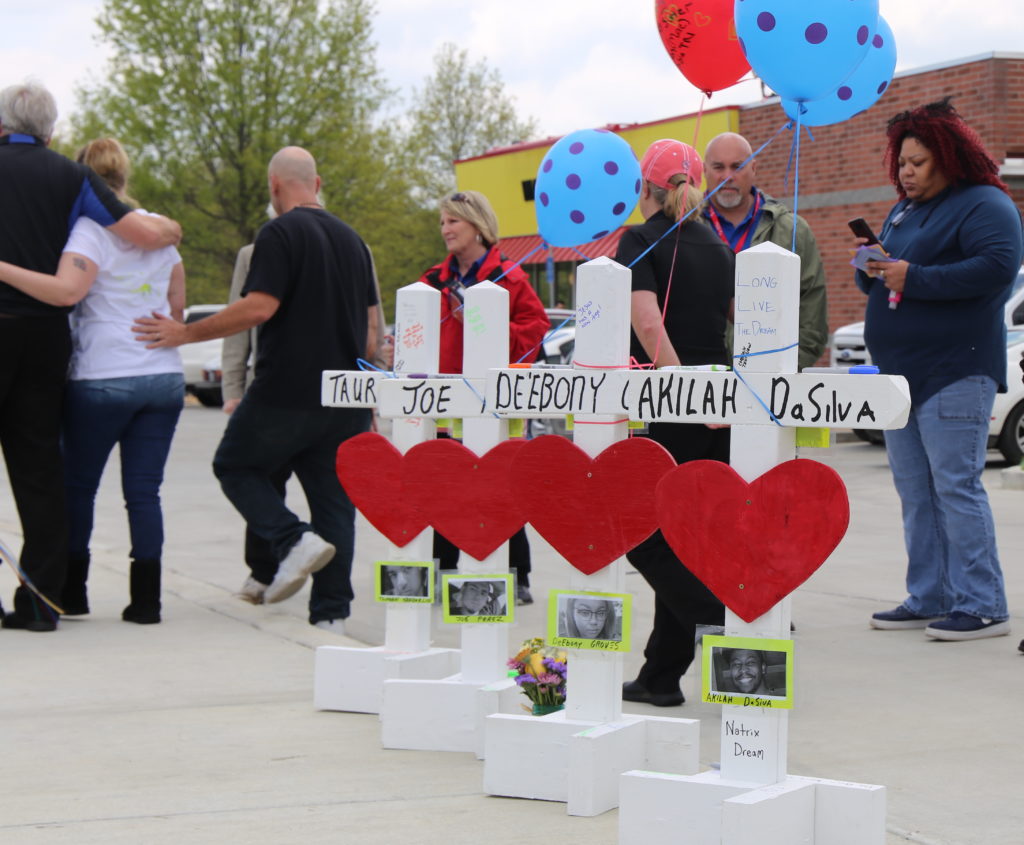
42 seconds. That’s how long it took for a Metro dispatcher to realize a police officer had been sent to the wrong Waffle House on Murfreesboro Pike on April 22, 2018. Moments earlier, authorities say, 29-year-old Travis Reinking had ambushed the restaurant with an AR-15, killing four late-night diners inside.
The family of one of the men who died that night could soon get some relief. Metro Council members will vote Tuesday on a resolution to settle a lawsuit brought by Shaundelle Brooks, the mother of Akilah DaSilva. She claims that mistakes made by 911 dispatchers slowed police, resulting in DaSilva’s wrongful death.
The vote falls on the eve of the two-year anniversary of his killing. And it could change how the city responds to future emergencies.
Metro argues the 42 seconds that an officer spent driving to the wrong restaurant location probably wouldn’t have saved DaSilva’s life. The 23-year-old was shot twice, sustained injuries to his heart and died shortly after at Vanderbilt University Medical Center. A trauma physician that the city hired to review DaSilva’s medical records told officials the damage was probably too serious to treat.
Metro’s legal department thinks the city would likely win in court. But they estimate the legal fees would exceed the cost to settle. So government lawyers are recommending a $35,000 payment.
The Metro Council already voted in support of a non-binding resolution last fall, which pointed out errors made by dispatchers after the shooting. Councilwoman Tanaka Vercher recommended that the city move quickly to settle with DaSilva’s family.
“They don’t want our pity. They don’t our benevolence,” Vercher said at the time. “They want us to convey to them that Akilah’s life actually mattered and that this government takes seriously the overall safety for everyone.”
The family’s attorney, Daniel Horwitz, says the suit has never been about the money
“It probably should not have taken two years and a lawsuit for Metro to take some responsibility for sending the emergency response to the wrong place during a mass shooting,” Horwitz tells WPLN News. “It’s extremely important that first responders go to where a crisis, an emergency, is occurring, after they’re dispatched. We can have the best firefighters, the best police officers in the world. But if we send them to the wrong place, there’s absolutely nothing that they can do.”
The law department wrote in a memo that the Metro’s Emergency Communications Center “has acknowledged significant errors were made regarding this dispatch.” The memo also laid out a detailed timeline of the breakdown in communication on April 22, 2018:
- 3:24:33 a.m.: The first 911 call comes in reporting a shooting.
- More calls follow in the next 20 seconds, including the one mentioned in the suit. In this fifth report, a caller tells 911 that the incident occurred at a Waffle House on Murfreesboro Road.
- The call-taker uses a third-party directory to find the address, and only one Waffle House is listed on Murfreesboro Pike, at 816. A newer location has since opened nearly 9 miles away, at 3571. That’s where the shooting took place. But it hasn’t yet been entered into the system.
- 3:25:38 a.m.: The call-taker submits a dispatch to 816 Murfreesboro Pike.
- A second dispatch also goes out, based on the correct GPS coordinates from another caller. But DEC uses the incorrect dispatch request and sends emergency personnel to the wrong location.
- 3:26:48 a.m.: A police officer receives the first, incorrect, dispatch. He leaves the scene of a car crash and heads to 816 Murfreesboro Pike.
- 3:27:30 a.m.: After realizing a mistake has been made, a new dispatch request goes out with the correct location.
- 3:32:20 a.m.: The first officer arrives at the scene of the shooting.
In addition to the payout, which will come from Metro’s Self-Insured Liability Fund, DaSilva’s mother has recommended “the timely transmission of caller GPS coordinates,” so officers aren’t sent to the wrong location in the future. She also wants the department to document employee errors in their personnel files.
The dispatch agency has agreed to consider policy changes. Horwitz says Brooks will share her formal recommendations with DEC after Metro’s vote.
“What, from day one, Ms. Brooks and her entire family set out to do after this horrible crime occurred, is ensure that there was accountability for what happened,” he says. “And they did everything that they could possibly do within their power to make sure that no other family would have to suffer the same tragedy that they did.”
DEC Director Stephen Martini says Metro has not yet received Brooks’ proposed policy edits.
“However,” he says, “we are willing to consider proposed edits to our existing policies once we receive them as we continually seek opportunities to improve the service we provide to citizens of and visitors to Nashville and Davidson County.”
This is not the only civil suit filed in response the Waffle House shooting case. Several of the victims’ family members, including DaSilva’s, have also sued Travis Reinking and his father, Jeffrey, who allegedly returned guns to his son after they had been confiscated. At least one of those suits has already settled out of court.
Reinking faces 17 counts in Davidson County Criminal Court, including four first-degree murder counts for the deaths of Akilah DaSilva, Deebony Groves, Joe Perez and Taurean Sanderlin. He pleaded not guilty in court last year. A trial date has not been set.
Samantha Max is a Report for America corps member.

